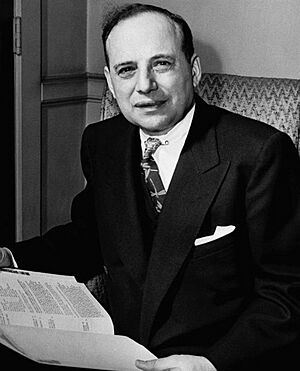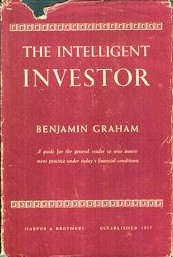Benjamin Graham facts for kids
Quick facts for kids
Benjamin Graham
|
|
|---|---|

Graham reading an edition of Moody's Manual, 1950
|
|
| Born |
Benjamin Grossbaum
May 9, 1894 London, England, UK
|
| Died | September 21, 1976 (aged 82) Aix-en-Provence, France
|
| Nationality | American |
| Institution | Columbia University University of California, Los Angeles |
| Contributions | Security Analysis (1934) The Intelligent Investor (1949) Benjamin Graham formula |
Benjamin Graham (born Benjamin Grossbaum; May 9, 1894 – September 21, 1976) was a famous financial analyst, investor, and professor. He was born in London, England, but became an American citizen. People often call him the "father of value investing".
Graham wrote two very important books about investing: Security Analysis (1934) and The Intelligent Investor (1949). His ideas focused on thinking for yourself, staying calm, and carefully studying a company before buying its stock. He taught that the price of a stock can be different from the real value of the business it represents.
After finishing college at Columbia University when he was 20, Graham started working on Wall Street. He later started his own successful investment fund called Graham–Newman Corp. He also taught investing at Columbia Business School, where one of his most famous students was Warren Buffett. Graham's ideas helped shape how many people invest today.
Contents
Early Life and Learning
Benjamin Graham was born Benjamin Grossbaum in London, England, in 1894. His family moved to New York City when he was just one year old. They later changed their last name to Graham to fit in better in America.
His family faced tough times after his father died and a financial crisis hit in 1907. This experience made Graham want to find good value in investments. He was a brilliant student and graduated from Columbia University at age 19. He was offered teaching jobs in different subjects, but he chose to work on Wall Street to help his family.
On Wall Street, Graham quickly became known for his smart ideas. One famous example was "The Northern Pipeline Affair." He found that a company called Northern Pipeline Co. had a lot of extra money that wasn't being used. Graham bought enough shares to make the company give some of that money back to its shareholders. This showed his belief in making companies use their money wisely.
Investing and Teaching Career
Graham's first major book, Security Analysis, was published in 1934. He wrote it with David Dodd. In this book, he clearly explained the difference between investing and speculating. He said that true "investment" means you do careful research and expect to keep your money safe while earning a good return. Anything else, he called "speculation."
His second book, The Intelligent Investor (1949), is considered one of the best books ever written about investing. Warren Buffett even called it "the best book about investing ever written."
Graham taught that when you own a stock, you are really owning a small part of a business. Because of this, you shouldn't worry too much about daily changes in stock prices. He used a famous idea: in the short term, the stock market acts like a "voting machine" (prices go up and down based on popularity), but in the long term, it acts like a "weighing machine" (the true value of the business will show in its stock price).
Graham talked about two types of investors:
- Defensive investors want to keep things simple. They don't trade often and hold investments for a long time. They don't try to guess what the market will do.
- Enterprising investors have more time and interest. They do a lot of research to find special opportunities in the market.
Graham advised enterprising investors to carefully study a company's finances. If a company's stock is selling for less than its true value, it has a "margin of safety." This makes it a good investment because there's less risk of losing money.
He believed that investing should be like running a business. It's about making smart choices to earn a good return and avoid big losses. He also stressed the importance of thinking for yourself. Graham famously wrote, "You are neither right nor wrong because the crowd disagrees with you. You are right because your data and reasoning are right."
Graham's most famous idea is the "Mr. Market" metaphor. Imagine you have a business partner named Mr. Market. Every day, he comes to your door and offers to buy or sell your shares at a different price. Sometimes his price seems fair, but sometimes it's silly. You can choose to trade with him or ignore him. Mr. Market doesn't mind and will be back tomorrow with a new price. Graham taught that you shouldn't let Mr. Market's moods decide the value of your shares. Instead, you should use his silly offers to your advantage and focus on how the actual business is doing.
Graham also thought that companies should be more open about their finances. He believed they should pay out dividends to shareholders instead of keeping all their profits. He warned against buying stocks at any price just because people thought they would grow forever. He stressed that you must always analyze a company's real financial health.
Graham's own investments did very well. From 1936 to 1956, his fund earned about 20% per year, which was much better than the average market return. One of his biggest successes was with GEICO, an insurance company. His firm bought a large part of GEICO in 1948. Years later, that investment grew to be worth a huge amount of money for his investors.
Personal Life
Benjamin Graham was married three times and had four children. He passed away in France in 1976 at the age of 82.
Legacy and Influence
Benjamin Graham is still known as the "father of value investing." His two books, Security Analysis and The Intelligent Investor, are still required reading for many people who work in investing today.
His most famous student, Warren Buffett, became one of the wealthiest people in the world by following and building upon Graham's ideas. Buffett said that Graham always wanted to do something foolish, something creative, and something generous every day. Buffett noted that Graham was best at being generous.
Many other successful investors have been influenced by Graham, including Irving Kahn, Walter J. Schloss, and Seth Klarman. Even though some of Graham's specific investing rules have changed over time, his main ideas about careful research, understanding a business's true value, and thinking for yourself are still very important.
Graham also had ideas about economic theory. He suggested a new way for countries to manage their money, different from the gold standard. He thought this was his most important work, and it gained attention again after the 2007–2008 financial crisis.
See also
- Warren Buffett
- Benjamin Graham formula
 | Emma Amos |
 | Edward Mitchell Bannister |
 | Larry D. Alexander |
 | Ernie Barnes |


